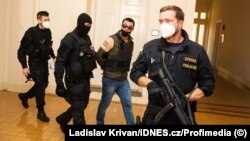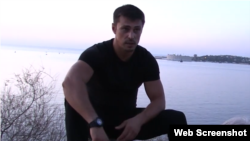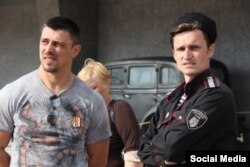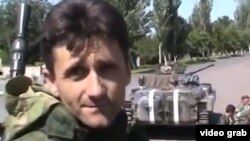PRAGUE -- For years, Aleksandr Franchetti lived a double life.
In Prague, his home off and on since the 1990s, information about the middle-aged Russian man arrested over the weekend for his alleged actions during Moscow's seizure of Crimea in 2014 is hard to come by.
At the gym where he apparently worked, people said they hadn't seen him for years or refused to comment. At a nondescript apartment building outside the city center, a ring of the buzzer bearing his adopted name goes unanswered.
In fact, most of the available information about what Franchetti may have done in Crimea comes from Franchetti himself, from web-posted interviews over the years in which he paints a flattering self-portrait of a humble patriot spurred to action to defend the port city of Sevastopol from potential saboteurs.
In any case, his past may have caught up with him on September 12, when he was arrested at the international airport in Prague on the basis of a request from the authorities in Ukraine.
In Kyiv's eyes, Franchetti was no defender: Ukraine wants to put him in the docket on charges of forming an illegal armed group. Franchetti, 48, could face up to eight years in prison if found guilty.
By Any Other Name
A search of public records indicates Franchetti was born in Voronezh on March 2, 1973, but under a different surname, as his sister has confirmed: He was born Aleksandr Olenev, Yana Oleneva, who still lives in the southwestern Russian city, told the Crimea.Realities desk of RFE/RL's Ukrainian Service.
That name also appears on a page of the Russian website dedicated to poetry --Stixi.ru -- which also includes a headshot of someone appearing to be Franchetti. Evidence also suggests he has used at least two pseudonyms, Aleksandr Kramarenko and Aleksandr Ol.
Aleksandr Molokhov, a representative of the Russian authorities in control of occupied Crimea, said that Franchetti was the last name of the Russian's ex-wife -- a woman he is said to have married sometime after he moved to the Czech Republic in the mid-1990s.
By 2013, Franchetti had acquired residency in the Czech Republic. In a report that year, the Russian Defense Ministry's TV channel Zvezda quoted his daughter, whom it identified as Dia Franchetti, as saying that her father "loved the Czech Republic and Prague."
Franchetti had indicated in the past, including in Internet postings, that he worked as a fitness trainer. In Prague, people at the gym where he has said he worked told Current Time that they had not seen him since 2015 or 2016.
No one answered when reporters from Current Time, the Russian-language network led by RFE/RL in cooperation with VOA, visited an apartment in the Prague 4 district on September 13 with a buzzer with Franchetti's name on it. Franchetti over the years has opened or run several businesses in Prague, most of which are no longer active or have been liquidated, a search of public records showed.
Train To Sevastopol
In an interview posted to YouTube in September 2014, Franchetti said he first traveled to Crimea on February 25, 2014, arriving by train in Sevastopol from Voronezh.
That was just two days before heavily armed men wearing green uniforms with no identifying insignia stormed the Crimean parliament in Simferopol, the capital of the Ukrainian region on the Black Sea, and raised the Russian flag atop the building.
As masked commandos in similar garb fanned out across the peninsula, surrounding Ukrainian military bases and taking control of other strategic facilities, what Russian President Vladimir Putin acknowledged much later was already clear to many on the ground: The "little green men" were Russian military personnel.
Russia cemented control over Crimea in March, after staging a referendum dismissed as illegal by most of the international community.
Franchetti said that he got his first "combat duty" on February 28, and that days later he created a paramilitary group called North Wind.
According to Franchetti, the unit patrolled wooded areas around Sevastopol, watching for any pro-Kyiv forces who might try to reach the city, and checked pipelines and power lines regularly to ensure there was no sabotage -- in other words, helping secure control over these facilities for anti-Kyiv forces.
In an interview posted on YouTube, Franchetti also claimed he acted in coordination with Russia's naval command at Sevastopol, which even before Moscow's seizure of the Crimean Peninsula was the main base of the Russian Black Sea Fleet.
Franchetti boasted about allegedly foiling a "saboteur plot" not far from a reservoir near Sevastopol, asserting that all the details of the foiled "diversionary group" had been handed over to the Black Sea Fleet.
His claims fit a Kremlin narrative about the events in Crimea at the time -- what turned out to be the groundless assertion of a major threat from Ukrainian forces that might seek to avert the Russian takeover.
But the details of this alleged operation are unknown -- and a search of public records by RFE/RL's Ukrainian Service turned up no information or mention of any military-type actions in the vicinity of Sevastopol in February and March of 2014.
North Wind, Or Bluster?
As with Franchetti, his name, and his actions, questions have been raised about North Wind itself. Franchetti said the group consisted of 12 people, although a search of public records turns up only three names with known links to the group: Fyodor Vetrov, originally from Sevastopol but living in Moscow; Ihor Pavlinenko, from the eastern Ukrainian city of Luhansk; and Dejan Beric, a citizen of Serbia.
Beric is a well-known figure, who fought later with Kremlin-backed separatists in eastern Ukraine, where a war that erupted weeks after Russia's seizure of Crimea still simmers after more than 13,000 deaths, and was frequently featured by Russian state-run media. He has also apparently worked as a journalist for PolitRussia, a "national, sociopolitical magazine," according to its website.
Information gleaned from his account on the Russian social network VKontakte indicates Beric now lives in Moscow, where he runs a fishing-tackle shop.
His friendship with Beric apparently landed Franchetti in hot water with Sergei Menyailo, picked by Moscow to run Sevastopol after the takeover. Beric became a critic of Menyailo, who left Crimea in 2016, after he refused a petition from Beric in 2015 to grant him Russian citizenship, labeling him merely a mercenary.
When the Russian occupying authorities announced elections in Sevastopol in 2014, Franchetti ran in the city's Nakhimovsky district as an independent candidate, but only got just over 1 percent of the vote in the unrecognized election after promising pension reforms and free "leisure centers" to apartment dwellers in the district, among other things.
His political aspirations dashed, Franchetti slowly disappeared from the separatist political scene in Sevastopol, according to Lenur Usmanov, a local pro-Russian activist who says he knew him well. "Many of these members of 'self-defense units' and others active in events of the 'Russian spring' found themselves with nothing to do. And Franchetti is no exception," Usmanov told Crimea.Realities.
For some time, Franchetti worked as an assistant for Olga Khomyakova, a member of the Russian-appointed local assembly in Sevastopol, before quitting the job.
He did remain, however, co-founding Sevastopol Defense, a so-called civic organization made up mostly of those who had been active in paramilitary groups on the peninsula. In 2016, however, Sevastopol Defense, was plagued by infighting ahead of the Russian State Duma elections -- with some, including Franchetti, backing Russia's ruling United Russia, and others supporting local separatist groups.
"There were even fights between them," a source close to the Sevastopol assembly told Crimea.Realities, requesting anonymity because of the "sensitivity" of the subject.
Planning A Move?
Since 2014, Franchetti has shuttled back and forth between Prague and Sevastopol, according to Usmanov, who said the Russian bodybuilder has also tried his hand at business. Franchetti would often travel back to the Black Sea peninsula with business proposals, only to have them rejected, Usmanov said.
Where exactly Franchetti lived in Sevastopol, Usmanov said he did not know. "The only thing I know for sure is that he had built a house in Sevastopol and was planning to move here for good from Prague. He said that he felt more comfortable here," Usmanov said.
Franchetti may feel more at home in Crimea. But he has apparently soured on Putin, who some of the militants who helped Russia seize Crimea or fought alongside separatist forces in eastern Ukraine fault for not going far enough to expand Russian control over portions of Ukraine.
"I am ashamed. I am very ashamed of this president, who was somehow elected -- I really don't know by whom. Over the past year or two, I have not met a single person who voted for him," Franchetti said in a video uploaded to the Internet in April 2020.
On September 14, a court in Prague ordered Franchetti to be remanded in custody pending a decision on his possible extradition to Ukraine.







